How often do you hear of a referendum where there is huge voter turnout and 90% vote in favor? We just saw two, both with the theme of secession:
Crimeans vote in referendum on whether to break away from Ukraine, join Russia
Crimean election Spokesman Mikhail Malyshev said the final result was 96.77 percent to rejoin Russia and 2.51 percent against.
That was with an 83% voter turnout.
Venice votes to split from Italy as 89% of the city’s residents opt to form a new independent state
In Venice, 73% of eligible voters cast ballots. The last time even 60% of voters turned out for a US Presidential election was 1968.
And it’s fairly clear that, despite attempts to quash it by the national government, Catalonia will vote to secede from Spain on November 9:
Spain Says Catalonia Can’t Vote for Independence, But Catalans Will Go Ahead Anyway
Last September 11, Catalonia’s national day, hundreds of thousands of Catalans formed a vast human chain across the region to call for independence.
According to a site that tracks all of the current wars on the planet, there are 33 other states working to gain independence from their national government. That’s in addition to the 534 militias-guerrillas and separatist groups who are actively fighting their own national government in 60 countries.
Perhaps people are just a bit tired of the confiscation of a huge chunk of their earnings by massive government bureaucracies that: use that money to spy on their own citizens; pass laws that clearly favor their interests over the interests of the people, including laws that apply to regular citizens but not to the lawmakers; jail people for stealing $500 from a convenience store but give rich cronies like Jon Corzine a free pass when they try to steal a billion dollars; start wars ruining countless lives and costing trillions of dollars, indebting current and future generations, wars that very few people want:
Americans Think the Afghanistan War Was a Mistake, Just Like All the Other Wars Since 1950
It took two years or less for public opinion to turn on the wars in Korea, Vietnam, and Iraq.
that pad their own salaries when regular people are struggling, as shown here:
When benefits such as health care and pensions are included, the federal compensation advantage over private workers is even larger, according to the BEA data. In 2012, federal worker compensation averaged…74 percent more than the private-sector average.
that create trade agreements such as the TPP, written in secret by corporate lobbyists, covered here by Bill Moyers:
The Top Secret Trade Deal You Need to Know About
that continue playing global power games while people in the US lose basic services:
US Prepares To Provide A Billion To Ukraine As Detroit Plans Mass Water Shutoffs Over $260 Million
Oh how, as we all know all too well, this list could go on and on. The more the powermongers try to centralize all control, the more they are creating resistance as people rightfully try to bring real governance back to their communities. Charles Hugh Smith has been doing some excellent writing recently on how the huge lumbering centralized structures created by government are a very poor match for the complexity (and speed, I would add) of today’s world (The Incompetence of the Federal Reserve and Deep State Is Unavoidable):
The incompetence of these organizations is not a reflection of the competence or intelligence of their managers–it is the intrinsic consequence of their limited control of complex systems. If the system has reached the point of being ungovernable, even the most brilliant and experienced managers will fail because it’s not the managers who are incompetent, it’s the organization itself that is incompetent.
I consider this move toward secession to be trend, not anomaly. Expect acceleration. In these votes for secession, people are getting just the smallest taste of actual democracy, so–and this is the true anomaly in today’s world where the political process has been captured by large corporations known as political parties, giving many people the correct idea that their vote counts for little or nothing–the turnouts are huge and the votes decisive.
I would go even farther: Today’s political process is intentionally designed to funnel the beautiful and brilliant energy of people’s good will–via voting where the choices are poor, monetary contributions, letter-writing campaigns, emotional attachments to issues and politicians, etc–into a black hole of ineffectiveness so the power elites can exercise ever-increasing control. They will fail spectacularly.

